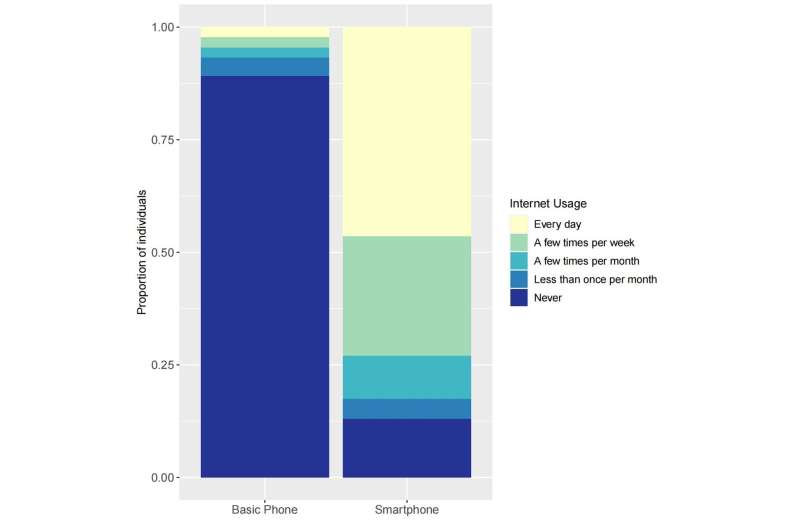Mobile phone requirement for mHealth in Africa could exclude the most vulnerable

A "digital transformation" is required across Africa before mobile health (mHealth) measures can be successfully implemented, according to a study published today in eLife.
The study shows that women, the elderly, those in rural areas and those living in poverty are less likely to own a mobile phone. This means they cannot access mHealth services, despite representing the demographics with the greatest current need for mobile health care solutions.
Many health care systems in Africa are under-resourced and difficult to access. mHealth services have the potential to substantially increase access to health care. If cost-effective, they would be invaluable in more rural areas where long journeys often prevent individuals from seeking medical care.
"mHealth services are currently being tested in trials in many African countries, but the requirement of mobile phone ownership to use the services creates a barrier to access," says first author Justin Okano, statistician at the Department of Psychiatry and Biobehavioral Sciences, David Geffen School of Medicine at UCLA, Los Angeles, US. "This is compounded with some services requiring a smartphone instead of a more basic phone. We sought to determine which demographics had the lowest rate of mobile phone ownership and therefore may be excluded from accessing mHealth services."
Okano and colleagues used data from the 2017–18 Afrobarometer survey for 44,224 individuals in 33 African countries. They looked for inequities in mobile phone ownership based on gender, urban/rural residency, age and wealth. They also determined whether an individual had a basic phone or a smartphone. The team plans to analyze more recent data once it becomes available.
Overall, they found that 82% of individuals own a mobile phone, which was equally likely to be a basic or smartphone. Despite this high rate of overall ownership, there was great variation between countries, which was even more pronounced with smartphones. There was also substantial variation within the countries, each having areas of low and high ownership.
One of the most pronounced factors was health care center proximity. Smartphone owners were more likely to live close to a health care center than basic phone owners, who in turn were more likely to live closer than non-phone owners. More generally, those living in urban areas were three times more likely to own a mobile phone, and three times more likely to own a smartphone.
Men had higher rates of ownership than women, and were also more likely to have smartphones. The team also observed that wealthier individuals were far more likely to own a mobile phone, although some of the poorest individuals in all 33 countries owned a smartphone.
This can be explained by existing schemes to provide smartphone access, as they have increasingly become a means for people to improve their livelihood. Notably, 13% of smartphone owners said they had never used it to access the internet, possibly due to high costs of internet services across the continent.
The authors did not determine the factors that underlie the inequities found, although they plan to explore this in future studies. Suggested reasons include the cultural norms of patriarchal societies reducing the agency of women, less digital literacy among women, rural residents and poorer individuals, and inferior infrastructure in poorer/more rural areas.
"Country-level differences in mobile phone ownership across Africa had not previously been quantified. The inequities we found in phone ownership were in the same groups that already had inequities in health care access," says senior author Sally Blower, Professor of Biomathematics at the Department of Psychiatry and Biobehavioral Sciences, David Geffen School of Medicine at UCLA.
"For mHealth interventions to be successful, and not exclude the members of society who need it most, a digital transformation needs to happen across the continent. It is not just mobile phone ownership that needs to be addressed. Electricity grids need to be extended, cell coverage improved and bandwidth expanded whilst ensuring affordability and sustainability."
More information: Justin T Okano et al, Lack of ownership of mobile phones could hinder the rollout of mHealth interventions in Africa, eLife (2022). DOI: 10.7554/eLife.79615




















